Bradley Johnson is one of those Derby County players who is only properly appreciated after they’ve left for pastures new. Often overlooked, regularly undermined. Sections of the Pride Park faithful would only see a multi-million pound signing who failed to win promotion with Derby. A footballer who collected his weekly wage and didn’t deliver top flight football. But there’s another side to the man.
“Me and my wife did a lot of fundraising for St Giles, who I still speak to now. They’re the only disabled school in Derby. They’re self-run so I spoke to the headteacher there and just asked if there was anything that I could do to help. When I went to that school it made me and my kids realise just how lucky we are to be healthy. It really hit home and so me and my wife put on a charity dinner to build a multigame area for the kids so they can go outside and play.
““When I take my son to football now on a Sunday, he plays for a local team and he plays at Derby Racecourse. When we drive past we can see the arena that we built and it’s nice to know it’s something that I’ve done for Derby and for the city and the school. We raised nearly £50,000 and they built that. Derby is home for me.”
At the time of writing, Derby have just lost 2-0 to Reading on opening day. It wasn’t great. But when compared to the previous game between the two that sticks out, it was almost enjoyable.
The 3-0 defeat on the final day of 2014/15 was the culmination of Steve McClaren’s first spell as manager. With Newcastle a constant distraction and the loss of Chris Martin and a genuine holding midfielder causing havoc, a once promotion-certainty of a campaign descended into capitulation.
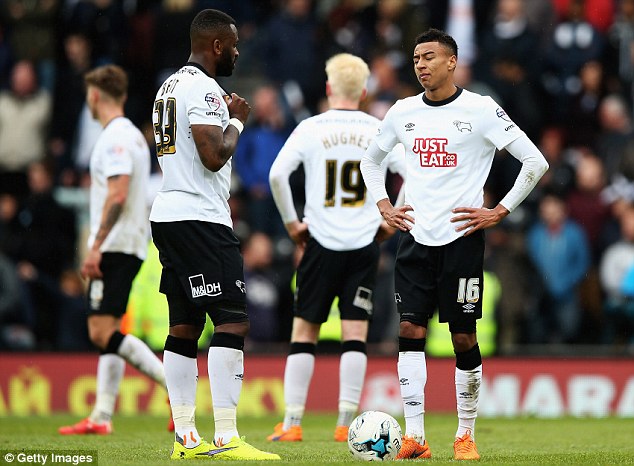
That afternoon ended McClaren, but it also ended a significant moment in the recent history of the club and began a new one. McClaren had spent minimal, simply adding slight tweaks to the budget squad Nigel Clough built before him. But with Mel Morris by now on board and attendances considerably higher than the afternoon Sam Rush took over as Chief Executive, Derby needed to go big-time.
And that’s where Bradley Johnson comes in.
Just promoted with Norwich City through the play-offs, Johnson was preparing for life back in the top flight. In fact, he was more than preparing; he was firmly a part of the plans. “We played Southampton away and lost 3-0 and then had two weeks without a game. I was back home in London with my family and I just got a call at 8pm from my agent saying a club were in for me and Norwich were looking to accept it or to get money for me. I just felt at that time when the bid got accepted, they didn’t see me in their plans going forward which was a disappointment. The year before I’d signed a four-year deal there so when you sign big contracts like that, you start planning and looking forward so I bought a house in Norwich, my first-born was born there and we’d put him into nursery so I thought we’d be settled there.
“I’d worked so hard the season before to get them back into the Premier League and it’s where I wanted to play, so it was a big decision for me to drop down a league and try and repeat it again.”
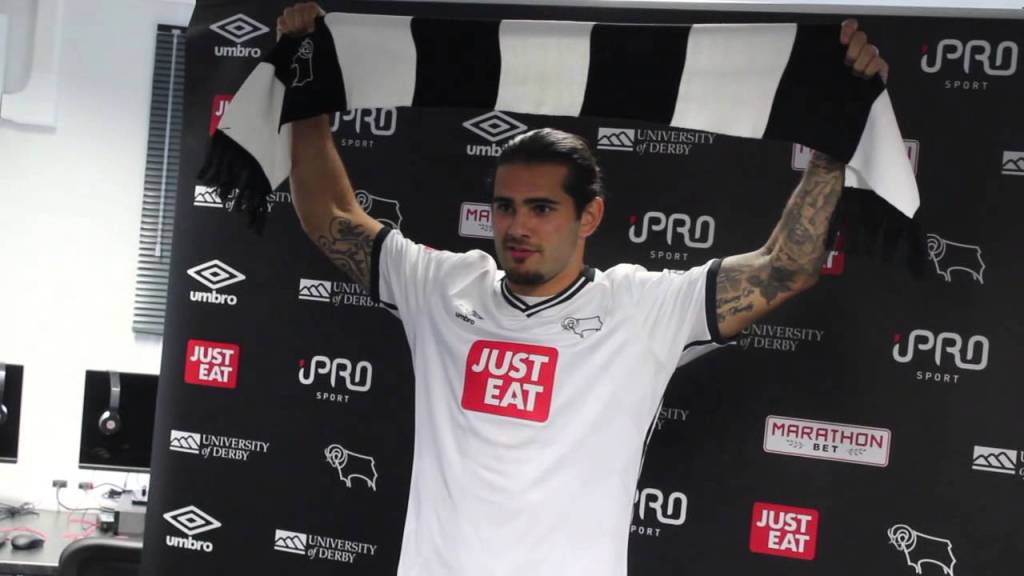
The interested party were Paul Clement’s Derby, by now desperate for central midfielders. The loss of Will Hughes and Craig Bryson on the opening afternoon in Bolton left gaping holes in the centre of the park and while Jacob Butterfield would be immediately highlighted as a £4m option from Huddersfield, Johnson was less expected.
“It was all a shock to me but when I saw everything, it became an easy decision really. I was upset about Norwich wanting to sell me but things like that happen in life and you have to look forward at the positives.”
So Johnson travelled to Derby, completed a medical and expected to sign on the dotted line for the club. But, as it was deadline day, it didn’t go quite to plan. “Alex (Neil) said before leaving, ‘look, I can’t let this happen if I don’t get a player in’. So he let me come to Derby, do my medical and I think the window shut at six so we didn’t have much time. I remember sitting at the training ground with Mel and everyone just sat at the table waiting for the phone to ring. It dragged on for two hours without a call so I make the phone call back and then he said he was waiting to get a player in.
“It got to half five and real panic kicked in with me comping here, seeing the training ground. I wanted the move to happen.”
“It got to half five and real panic kicked in because with me coming up here, seeing the training ground, I wanted the move to happen. Sitting there at half five we only had half an hour, and I’d never moved on deadline day so I didn’t know how long the paperwork took. But they agreed to it at 5:55 and it was all a bit of a panic because once the papers get sent to Derby, Derby have to send it to the FA before 6pm. Clare the secretary was running around pulling her hair out but the fax came in at 5:58 so it was a bit of a mad one.”
By 6:01, he was thrown before the Sky Sports cameras. And that’s when he declared his love for Derby City, oblivious to the fact that in the process of becoming the club record signing at £6 million, he’d got the name of his new employers wrong. In many ways, it was an apt beginning for Johnson’s time at Derby, a time that never took off in quite the way anyone expected.
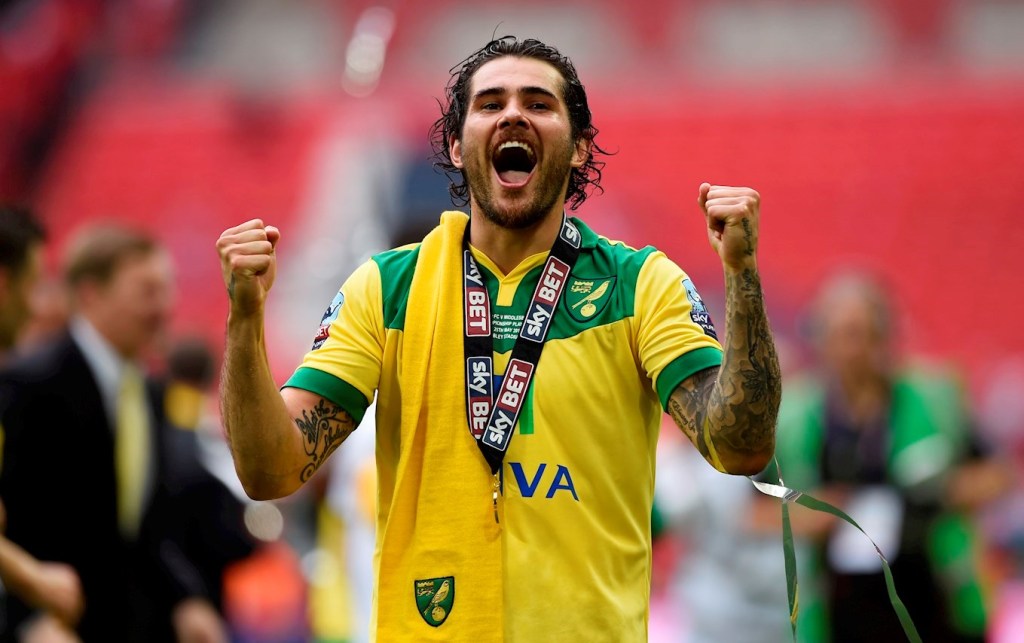
Having bagged 15 goals the season prior and become a City cult hero in the process, a more attacking Johnson was expected to slot seamlessly into a side expected to follow the Canaries to the top division. But his first two seasons at the club would not go to plan.
It started with Clement who, despite a glistening CV as Carlo Ancelotti’s assistant across Real Madrid and Chelsea, struggled to implement himself in his first senior role. “He had been at big clubs with big managers and this was his first managing job so it was always bound to be hard for him” Johnson reflects. “Being a coach to a manager, I’m doing my badges now so I can sort of relate and know how hard it is. I just felt that the Championship is a very hard league and you can’t always just play one way, you have to adapt to how other teams play but he stuck by his morals and wanted to play that way. I think in the end the only thing that matter is results and though we were playing pretty football, we weren’t getting results and that’s what happened.”
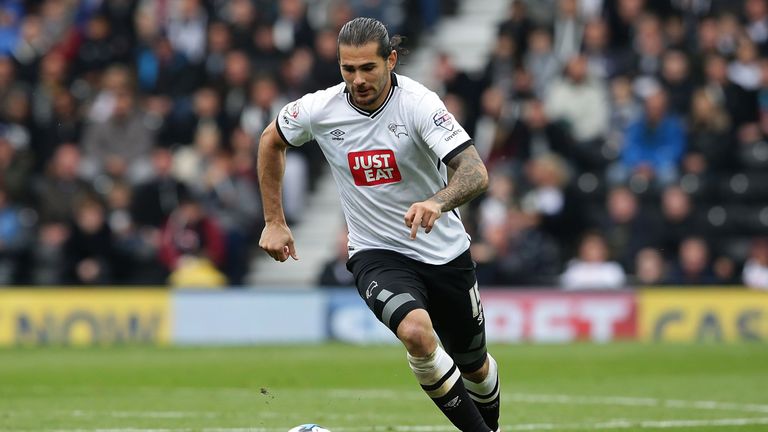
And then there was Darren Wassall, who like his predecessor, couldn’t work out how to get the best from Johnson. Between the two, they’d try him on the left, in the attacking centre, deep lying. Every week a new role would be thrust Johnson’s way, with no opportunity to make a set position his own. Signed from Norwich after starring on the left hand side of a midfield, he found himself in a side vastly different in set up to the one he had departed and over the course of his Derby career, he was left battling for a place to call his own.
“It was hard at Derby.”
“At Norwich I played wide on the left in a 4-4-1-1 but Derby’s way of playing was a 4-3-3. I’ve been known as a centre midfielder but that one season in Norwich I was out on the left and it worked for us. We knew I weren’t really a left winger so we worked on crosses coming in from the right-hand side. We had Nathan Redmond who was a terrific winger, he had to beat his man and cross it and I knew what he was gonna do, he knew what I’d do and he was our outlet. We worked everything down the right because we knew I wasn’t a winger who would beat the man and I knew when he beat his man that the ball would get crossed because it’s what we were told to do. I knew my job and I was good in the air and scored a lot of goals at the backpost that year.
“But it was hard at Derby. Being under so many managers, every one will have their own opinion of you and thinks where you can play best and they try and fit you into a system. I wanted consistency and to hold down a position but managers make the decisions and you have to stick by that. Some games I was wide left of the three up front which I had never, ever played before but I tried my hardest. Managers get changed and a new one wants you somewhere else but it has an effect.”
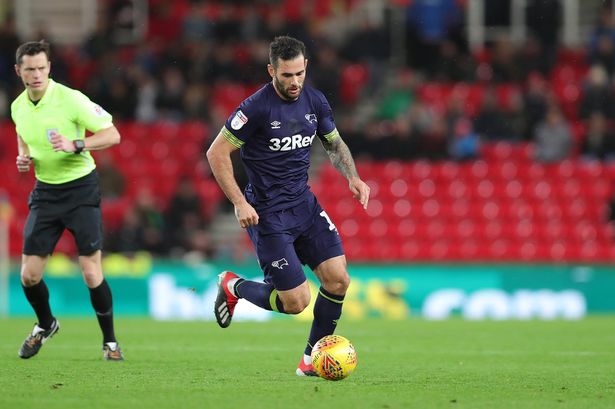
Johnson’s first full campaign did have moments where it threatened to blossom (including when he wrote himself into folklore when he fought a Forest fan on the pitch), particularly late on. But ultimately, his first run in a Derby shirt was a disappointment. Come the second leg of the play-offs, he was an unused sub, with Wassall favouring the classic trio of Hendrick, Hughes and Bryson.
With Nigel Pearson his third manager in a year, he was handed a vote of confidence when outed on the opening day of 2016/17. And yet, barely an hour into his second season, his manager had turned on him and his own fans booed him off the pitch. Johnson was lost.
“I’ll never forget that game. Jeered off because I had a bad game.”
“I didn’t have the best time of times underneath him. He didn’t see where I was good enough to get in his team. And I I remember the first game of the season, he played me in at left wing and it’s the only game where I’ve been booed off and dragged. I’ll never forget that game. Jeered off because I didn’t have a good game and fans are entitled to their opinion, I’m old enough and big enough to not let it get to me but I did it for the team and it didn’t work out. I wouldn’t say he threw me under the bus but I just didn’t get back in and then it looked like ‘oh, I’m not good enough to play for his team’. He’s a nice man but footballing wise I didn’t enjoy it because I just couldn’t get into the team.”
Pearson would go infamously in the back of a taxi from Cardiff, and that evening Johnson found himself in Chris Powell’s side for their first win of the season (and let us not forget it was a night that Nick Blackman scored a Derby County goal). But still Johnson would struggle under McClaren, still searching for his identity in a side desperately trying to find their own as a collective.
His final two years as a Ram led to stability though. Under Gary Rowett, who Johnson runs out of superlatives to describe, he would make a role in central midfield his own, outed 35 times and becoming an integral part of the more defensive set up that the then manager looked to adopt.
It was in his last campaign at Pride Park that Derby fans saw their very best version of Johnson though. Under the tutelage of Frank Lampard, a man Johnson had come up against in his Premier League days, he became a lynchpin of the rookie manager’s line up in those early months, adapting to the high demands of a man who prided his career on energy and drive.
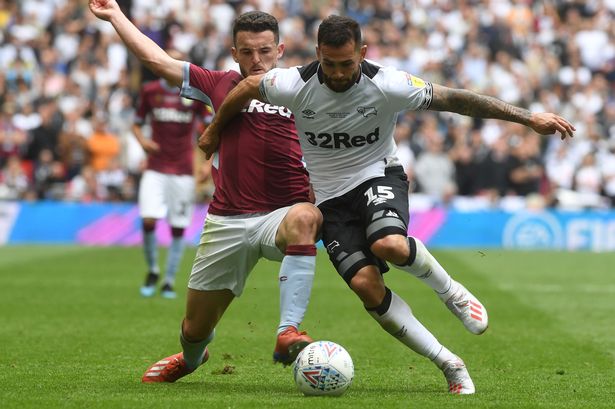
“I was buzzing when he got the job,” Johnson admits. “He was someone I looked up to throughout my whole life as a midfielder, he’s one of the best midfielders in this country – if not the world. What he did in the game is just unbelievable. For him to come here and for me to get the chance to work underneath him and him being your manager, I was looking forward to it.”
And building from the place Rowett found for him, Lampard highlighted Johnson as an integral part of his midfield, the wiser old head behind Mason Mount and Harry Wilson. Usually favoured over Tom Huddlestone and having fought off the battle from Joe Ledley, Johnson was in his element until a lengthy ban for biting Joe Allen at Stoke cut his run short.
“I enjoyed every minute at Derby, the only downer is not getting promotion.”
But even after being sidelined and shoved to train with the youngsters, Lampard would call upon him once more. When it looked as if Johnson’s Derby career would be rounded off with him falling completely out of favour, his own personal drive in training meant he would be back in for the business end of the season. In the process, he’d deliver what many fans believed to be his finest months in white. That’s why, in a Derby career that included jeering from his own supporters, lengthy spells out of the side and on-pitch brawls, there was sadness when his contract came to an end in the summer of 2019, following more play-off despair.
“I enjoyed every minute at Derby, the only downer is not getting promotion. My aim coming here was to get Derby to the Premier League. But I can look in the mirror and be happy for what I tried to do for Derby. And then when I played against them three or four weeks ago for Blackburn, the ovation is one I’l never forget. I walked around after and every fan was up on their feet singing my name, I’m very proud of my time at Derby. “And I’m settled here in Derby and I’m probably settled here for life now. I’ve got three kids and my wife, my kids go to school here in Derby, the city is a great place to live and I felt that from the day I first walked into the club. Not just the players but the staff, the groundsmen, the people in the canteen, it was such a family feel at the club. My sons are Derby fans so my eldest always wants to go to the games because all his mates are fans. I’ll always have a place in my heart for Derby.”
Pride: The Inside Story of Derby County is now available from the DCFC Megastore and to pre-order on Amazon and Waterstones. From Stefano Eranio and Colin Todd through to Harry Wilson and Gary Rowett, it’s the story of Derby since 1995 by those who know it better than anybody.
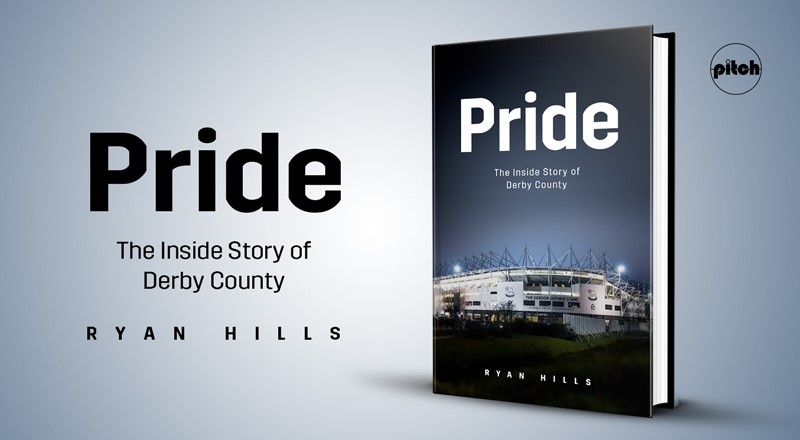

Wonderful insight, very well written…thank you….
LikeLiked by 1 person